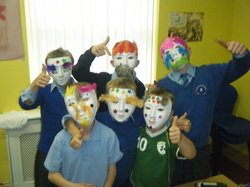OUR AFTERSCHOOL

We aim to make a clear distinction between school and after-school care. We aim to provide space for children to run and let off steam, while at the same time providing them with a quiet space to relax. We aim to provide a range of stimulating and interesting activities that the children feel motivated to take part in. Children are encouraged, but not forced, to take part in activities. It part of our ethos to introduce a “learning by doing” philosophy where children will have an opportunity to learn and try out new but none the less important skills and activities which are not on a standard curriculum but are none the less important for life long living.
A regular programme of activities is developed each term. Activities will include art, drama, and outdoor pursuits. Please ask the staff for the weekly plan of activities, this will enable you to better co-ordinate picking children up after (or before) an activity.
Programme activities the after-schoolers will be involved in are designed to encourage children to:
o do their best
o keep fit and active
o satisfy their curiosity and need for adventure and new experiences
o be creative and develop a sense of accomplishment
o make choices
o develop a sense of fair play, trust and caring
o work together in small groups and experience being a “leader”
o participate in outdoor activities
o Learn about the natural world and their part in it.
o Get involved in the planning of activities and putting forward ideas for activities that interest them.
A regular programme of activities is developed each term. Activities will include art, drama, and outdoor pursuits. Please ask the staff for the weekly plan of activities, this will enable you to better co-ordinate picking children up after (or before) an activity.
Programme activities the after-schoolers will be involved in are designed to encourage children to:
o do their best
o keep fit and active
o satisfy their curiosity and need for adventure and new experiences
o be creative and develop a sense of accomplishment
o make choices
o develop a sense of fair play, trust and caring
o work together in small groups and experience being a “leader”
o participate in outdoor activities
o Learn about the natural world and their part in it.
o Get involved in the planning of activities and putting forward ideas for activities that interest them.
HOMEWORK SUPPORT
We encourage (but do not force) children to complete their homework in after-school time, because we feel that it is best completed while it is still ‘fresh in their minds’. Please discuss with your child whether you would like him/her to do their homework in after-school or at home. A scheduled time is dedicated each day for homework supervision. If a child persistently misbehaves during homework they will be asked to leave the homework session.
Homework is fosters independence, self-reliance, self-esteem, co-operation and responsibility and life long learning. It is an essential part of primary education as it re-enforces what children learn in school. It provides a link between teacher and parent and encourages parental involvement in their child’s education. In general, homework is meant to be achievable by a child working on their own to the best of their ability. It is normally prepared by the teacher in class. It can be used to practice what is done in school or can be designed to challenge children’s ability and provide opportunities for creativity.
Duration of Homework
The following are guidelines for time spent at homework. Different children will complete the same homework in different lengths of time. Time spent will vary from day to day and also from the beginning to the end of the school year. It is important to remember that it is the quality and not the quantity of homework that matters. The following are general guidelines:
Junior and Senior Infants > 0-20 minutes
1st and 2nd Class > 20 to 30 minutes
3rd and 4th Class > 30 to 40 minutes
5th and 6th Class > 40 to 50 minutes
After-school staff will:
Homework is fosters independence, self-reliance, self-esteem, co-operation and responsibility and life long learning. It is an essential part of primary education as it re-enforces what children learn in school. It provides a link between teacher and parent and encourages parental involvement in their child’s education. In general, homework is meant to be achievable by a child working on their own to the best of their ability. It is normally prepared by the teacher in class. It can be used to practice what is done in school or can be designed to challenge children’s ability and provide opportunities for creativity.
Duration of Homework
The following are guidelines for time spent at homework. Different children will complete the same homework in different lengths of time. Time spent will vary from day to day and also from the beginning to the end of the school year. It is important to remember that it is the quality and not the quantity of homework that matters. The following are general guidelines:
Junior and Senior Infants > 0-20 minutes
1st and 2nd Class > 20 to 30 minutes
3rd and 4th Class > 30 to 40 minutes
5th and 6th Class > 40 to 50 minutes
After-school staff will:
- Encourage a positive attitude towards homework in all subjects.
- Encourage children to work independently as far as possible and resist over-helping.
- Encourage children to organise themselves for homework. Have all books and materials to hand. The children should have the Homework Journal open to tick off work as it is completed.
- Agree a suitable time for doing homework, taking into account of age, the need for playtime, relaxation and after-school activities.
- Providing a quiet place, suitable work surface, free from distractions, interruptions and T.V./ radios.
- Communicate continued homework difficulties to the parent/ guardian at home-time.